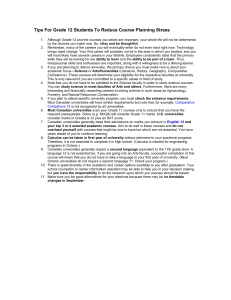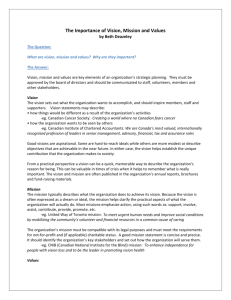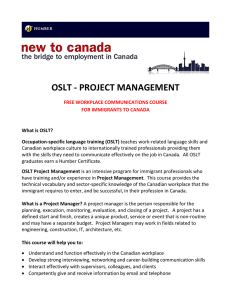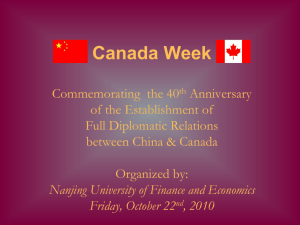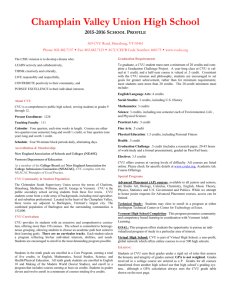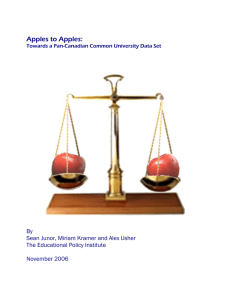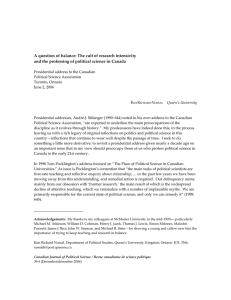EDUCATION GUIDE
advertisement
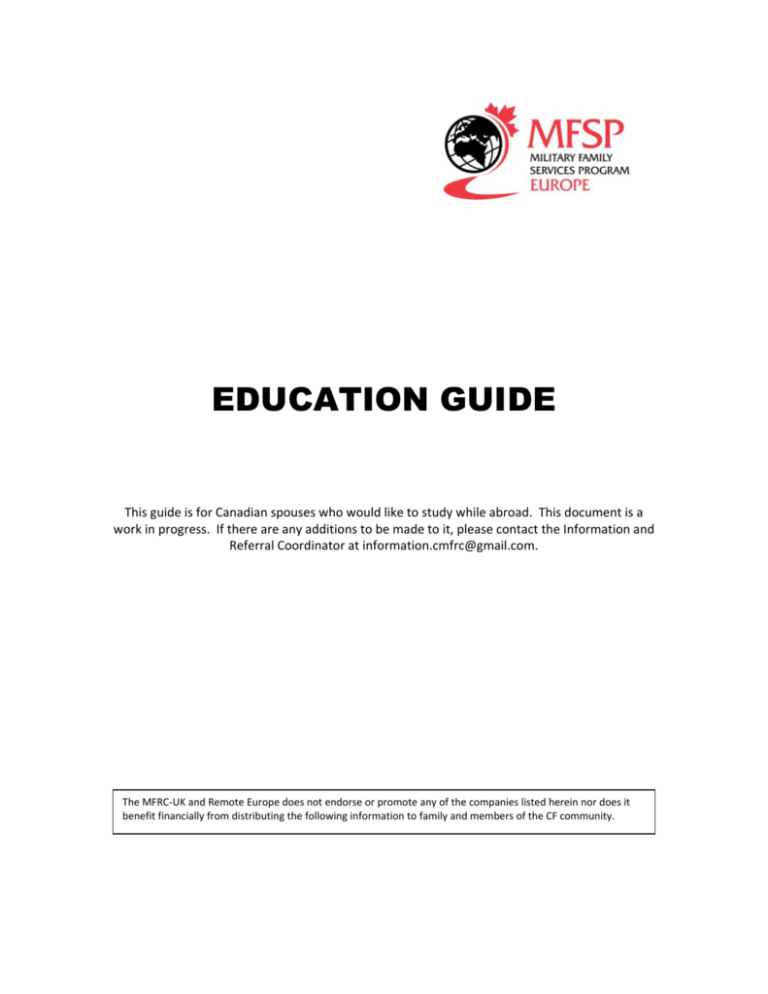
EDUCATION GUIDE This guide is for Canadian spouses who would like to study while abroad. This document is a work in progress. If there are any additions to be made to it, please contact the Information and Referral Coordinator at information.cmfrc@gmail.com. The MFRC‐UK and Remote Europe does not endorse or promote any of the companies listed herein nor does it benefit financially from distributing the following information to family and members of the CF community. An OUTCAN posting is an ideal time for spouses to continue their education whether through part‐time or full time studies working towards a degree or certificate, professional development or taking a special interest course for fun. There are a number of options available. Foreign Student Fees If you plan on studying with an international university, Canadian spouses must pay foreign student fees and these fees can be double or triple what a UK or EU student will pay. One way to lower the fees may be to undertake a part time versus full time course of study. The degree may take an extra year or two to earn but cost considerably less in the long term. Distance Learning with Canadian Universities The following information was obtained from “School Find Distance Learning: Earn your degree via correspondence,” written by Particia Grimshaw. It has been edited for length and updated where required. More and more universities and colleges are providing distance learning courses and degree programs for those who are physically unable to attend classes. A number of institutions in Canada offer distance learning programs at the post‐secondary, post‐diploma and/or post‐ graduate level. Courses vary widely – they may be semester‐based with specific start and end dates, or based on a timeline from the date of your enrolment. In addition, some courses may require paper assignments, meaning you have to mail in essays or reports, while others may be web‐based. While doing some of your own research is imperative to getting the most out of a given program, here are a few ideas to start you off: Canadian Virtual University (CVU) Start your search here. The CVU is a “consortium of Canada's leading universities in distance and online learning.” All of its universities are accredited Canadian schools and include such institutions as Acadia and the Royal Military College of Canada. Courses are available at all levels, from diploma to Doctorate. Links take you to the individual universities, but this site provides an excellent list from which to pick and choose. www.cvu‐uvc.ca/english.html Humber College Institute of Technology and Advanced Learning With its main campus in Toronto, Humber College offers a variety of distance learning courses which cover everything from accounting to fashion design, psychology to plumbing. Humber is mainly geared towards vocational learning, so it’s not recommended for someone looking to earn a Master’s degree or equivalent. www.humber.ca Athabasca University This self‐titled “open university” prides itself on delivering distance education to people around the world. It’s essentially a university without a campus – they bring the school to you through their distance learning programs. Athabasca offers both undergraduate and graduate courses, including a Master of Arts in Integrated Studies and a Master of Nursing program. Its undergraduate program is also very diverse. There’s a great deal of flexibility to the individual student. www.athabascau.ca/ Royal Roads University Once part of the Canadian Forces, Royal Roads University provides specialized education geared towards the workplace. While not entirely distance learning, RRU offers a “blended model” combining short on‐campus residencies with Internet‐based distance education. Although it means that you’d have to take the time to attend the campus, the university does offer some excellent graduate programs, including a Master of Arts in both Conflict Analysis and Management, and Leadership. Courses from these degree programs, while not necessarily traditional in the truest sense of the word, can go a long way in today’s tough international business world. www.royalroads.ca/ Distance learning isn’t for everyone. You need to be willing to commit to the program, without having a professor to remind you of your next assignment or reading list. You must be more self‐ disciplined than in a regular classroom environment in order to meet the demands of the course. Not all institutions offer entire programs online either, but many offer correspondence courses as part of their regular program curriculum, and they’re more than willing to send you a course calendar to get you started. Distance learning is an excellent way to add to and improve your academic resumé. Not only may it possibly improve your employability, but it will also add to your own personal education – something that you’ll always have with you, no matter where you live. Education Coordinator If you need answers to specific questions regarding education you can contact the Education Coordinator Canadian Forces Support Unit (Europe) in Geilenkirchen, Germany. Please contact Renee Henderson at renee.henderson@forces.gc.ca for more information. ADULT ONLINE EDUCATION If you are interested in online and/or distance learning that charges tuition and provides a traditional classroom approach with minimal students and lots of possibility for interaction with the professor, Learn4Good is a great resource for information on these more traditional course formats. OpenCourseWare is a good choice if you are interested in learning the class material, but do not necessarily want to receive credit or pay for the course. Many schools, including MIT, Harvard and Stanford, provide course content online that includes the reading materials, lecture notes and syllabus. The latest craze in online learning is called Massive Open Online Courses (MOOC). Three of the most popular MOOCs are Coursera, Udacity and edX. These organizations teach courses using traditional course materials including video lectures, readings, problem sets, projects and exams, but as the name implies, there are thousands of students enrolled in each class. To facilitate student interaction on such a large scale, forums are the main way in which students, teaching assistants and professors communicate with one another. These courses are free to take, and most offer a certificate of completion but no credit.

